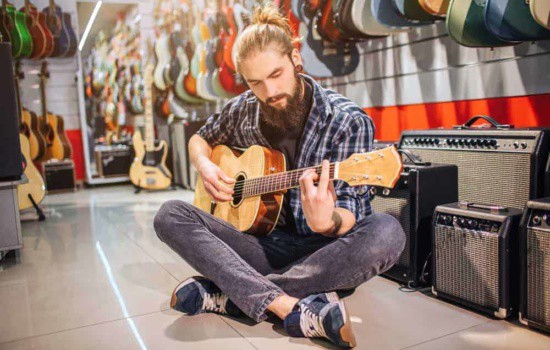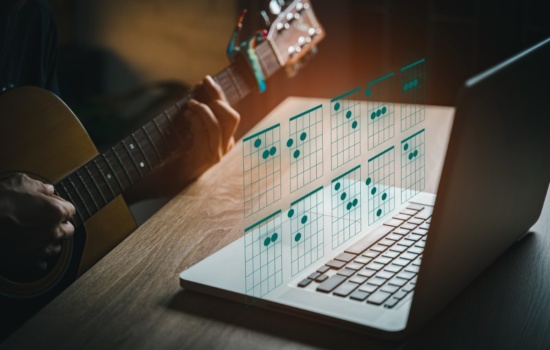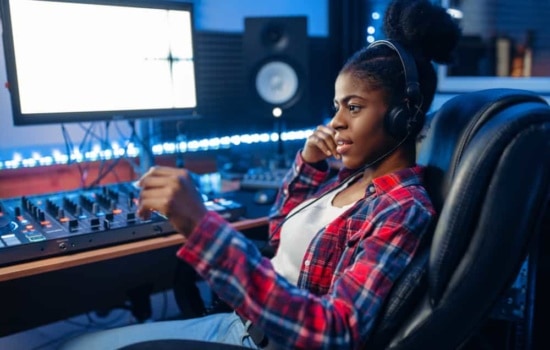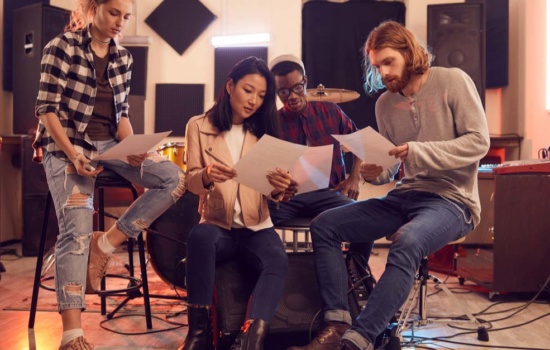Music Career Finder
Survey Start
Guitarist
Career Overview
Guitarists are skilled performers who also frequently write and record their own music. In addition to practicing and performing, they teach, handle tasks such as booking shows, and collaborate with other musicians.
Alternate Titles
Guitar Player
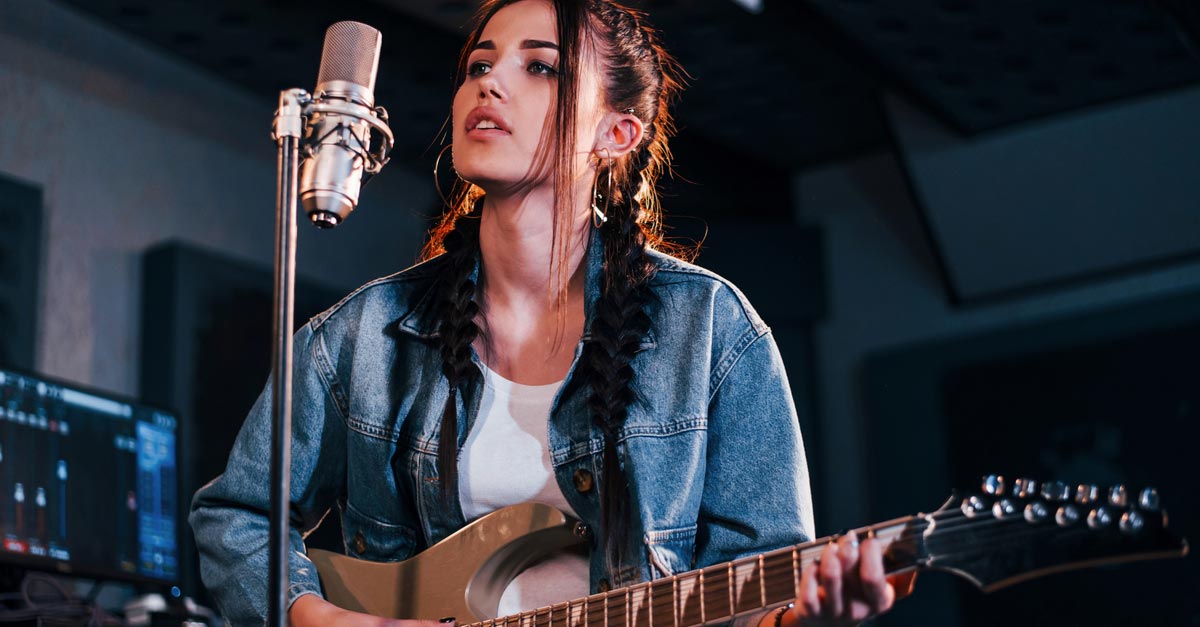
How To Become a Guitarist
- A guitarist plays the acoustic, electric, and/or classical guitar during live performances or in the recording studio
- Many professional guitarists also teach guitar lessons
- You probably won’t be working a typical 9-5 work schedule
- Guitarists are usually freelancers
- Practicing the guitar is at the heart of being a professional guitarist
- A guitarist’s average income is $34 per hour or $70,781 per year
- Career Description
- Salary
- Career Outlook
- Career Path
- Experience & Skills
- Education & Training
- Sources
- References
Career Description
Guitarists play the acoustic, electric, and classical guitar, in the studio context and/or during live performances.
What Does a Guitarist Do?
Here are some of the main responsibilities of a career guitarist:
- Practice regularly to keep their skills sharp (even learning how to play in multiple genres)
- Record guitar parts for others’ songs (whether in a professional studio or from their home studio)
- Record and release original music
- Perform live with a band
- Teach guitar lessons
A Day In the Life of a Guitarist
Being a guitarist can look different for each person depending on their career path.
For many guitarists, a typical looks like this:
- Practicing scales, chords, and songs
- Booking gigs
- Giving guitar lessons
- Keeping your website updated
- Phone calls and emails
- Creating content for social media
Salary
On average, guitarists make about $34 per hour, or $70,781 per year1.
This can vary widely depending on whether a guitarist is a studio musician, a touring guitarist, a guitar teacher, or some combination of those things.
How Does a Guitarist Make Money?
Most professional guitarists are freelancers, so they work on a project basis and negotiate their own rates.
Here are the main ways a guitarist can make money:
- Getting hired as a session musician (whether in a studio or to record remotely)
- Teaching guitar lessons (privately or at a music school or music shop)
- Touring with their band
- Playing in cover/tribute bands
- Performing at weddings and private events
- Sitting in for another band’s guitarist
- Busking
Starting out as a guitarist, you’ll probably play in bars, clubs, and at community events. Pay is usually low, maybe $100 a night.
If you play at private events and weddings, you can make much more, somewhere in the ballpark of $300-500 per gig.
As a guitar teacher, you can charge $20-50 per hour, usually giving 30-minute lessons.
Now, if you find major success, you can make hundreds of thousands or millions of dollars per year.
For example, guitarist Eric Clapton’s net worth is estimated to be $450 million. And Queen guitarist Brian May is worth £160 million. Just a couple of examples of the potential for uber successful guitarists.
Hey, what do you think about trying our new Music Career HelperMusic Career Helper really quick? It’s totally free and could help get your career moving fast! Give it a try. It’s totally free and you have nothing to lose.
Career Outlook
As a career guitarist, you won’t work the typical 9-5 schedule of a “normal” job.
Because you will probably be a freelance guitarist, it’s not going to be easy. You have to be a self-starter and hustle to find work.
But you can definitely build and sustain a career as a guitarist.
The key is to be great at guitar and always be improving.
Also, the guitarists we interviewed said you need to have multiple income streams. Fisk said you should have “as many income streams as you possibly can.”
Career Path
The first and most important step is to master the guitar.
Some people go to school to get a degree in guitar, while others choose to learn on their own.
From there, you can explore the several income streams we covered in the Salary section.
The most consistent sources of revenue for guitarists seem to be2:
- Performing at weddings
- Playing in cover/tribute bands
- Giving guitar lessons
Experience & Skills
Here are the main skills you’ll need to succeed as a professional guitarist…
Practice
The aspiring professional Guitarist needs to spend long hours practicing.
While this takes a certain amount of discipline, it isn’t as hard as it seems, because it’s great fun to practice as knowledge accumulates and learning surges ahead.
According to most pros, practicing gets harder later on because it can be frustrating to have to relearn things you forgot, and you won’t be moving ahead as quickly day-to-day.
Most Guitarists practice more when they’re starting out than later in their career, depending on time available and what they need to accomplish.
Play In Many Different Genres
Being able to play well in different genres makes you more valuable and should give you more opportunities.
For example, you could play in a Led Zeppelin cover band one night, sit in with a jazz ensemble the next, and teach classical guitar the following day.
Read Sheet Music
There may be times, especially as a session musician or when sitting in for another guitarist, someone will put a piece of sheet music in front of you and say, “Play that.”
So you need to know how to read sheet music if you want to get work as a guitarist.
Learn How To Record at Home
One income stream you could pursue is remote session work. This would be where a songwriter, artist, producer, or engineer hires you to record some guitar parts for a song from your home studio. So it can be very valuable to learn basic recording techniques.
Education & Training
Here are some things you can do to educate and train yourself to build a career as a guitarist…
Take Private Lessons
Taking guitar lessons will not only help you improve quickly as a guitarist, but you’ll be able to see how lessons work for when you start teaching others.
Earn a Guitarist Degree
You can earn a music degree, like a Bachelor of Music degree with a concentration in guitar performance or music education.
While colleges and universities are an expensive way to learn, keep in mind that there are also many scholarships available. Studying with an array of experienced faculty at a college or university can be an immensely valuable life-changing experience.
Going to a top school in a major urban center (e.g., New York City or Los Angeles) can lead to many professional opportunities and is a great way to cram a lot of learning into a relatively short time. What you can learn in school in a few years might take a lot longer to learn otherwise.
Practice
Practice will be at the heart of what you do as a guitarist.
According to the experts we talked to, the consensus is to practice 4-6 hours a day.
Now, when Campilongo is giving lessons, he tells his students to try and practice for just 5 minutes a day because “five minutes will generally turn into twenty once you’re in it.”
“…If you say you have to practice an hour or not practice at all, people will choose not to,” he said.
To progress from a beginner to an intermediate student player usually takes 6-12 months of study and practice. To become an advanced player or a concert-level student performer, it could take 3-5 years for most people.
Sources
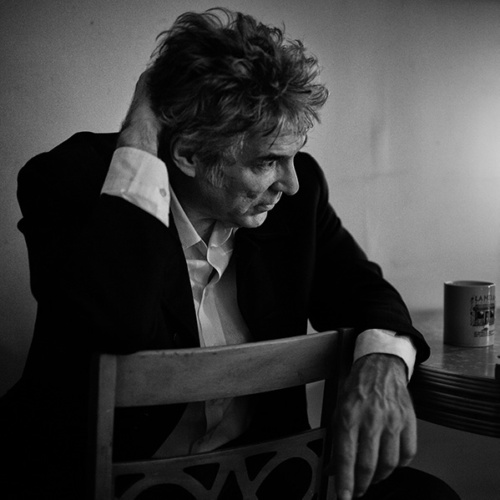
Jim Campilongo
When TONEQUEST MAGAZINE wrote “…another stellar Campilongo record from the fertile mind of Jim Campilongo. How does he do it? Damned if we know…” they were looking at an overview of Campilongo’s fourteen solo releases and commenting on the music’s growth and diversity. The Jim Campilongo 4 Tet is another step in this evolution.
BILLBOARD MAGAZINE calls Jim Campilongo “an American treasure,” an accolade which this Guitarist’s artistry and influential career has richly earned him. TIMEOUTNYC describes Campilongo perfectly–”New York has no shortage of guitar heroes but few cover as many bases as Jim Campilongo; reveals a range that extends from seductive country-swing to atmospheric jazz and well beyond.” And the NEW YORKER says “There it was again: the stinging treble, the spooky overtones, the strings snapping and booming under his hands the sound of a Tele being played as skillfully and exuberantly as it can be played, it sounded like nothing and nobody else sounded like Jim Campilongo.”
With fourteen albums of original material and guest appearances on dozens of recordings–from the Bammie-winner’s contribution on Cake’s million-selling Prolonging the Magic to (most recently) doing lead guitar duties with The Little Willies, his band with Norah Jones–Campilongo has played with JJ Cale, Al Anderson, Gillian Welch/David Rawlings, Peter Rowan, Martha Wainwright, Bright Eyes, Teddy Thompson, and Burning Spear to name a few, has earned two Gold records, and has written music for national ads for National Grid, Volkswagen, SBC, Michelin and Jack Daniel’s.
Campilongo also had repeat appearances on The Late Show with David Letterman, Late Night with Conan O’Brien, Later . . . with Jools Holland (BBC), Abbey Road Sessions (BBC), and has been interviewed on many major radio shows.
THE NEW YORK TIMES
“Through the lean ropy sound of his Fender Telecaster, Mr. Campilongo connects American styles (Blues, Rock, Country, Jazz, R&B) in a sly knowing way.”
THE NEW YORKER
“Jim Campilongo holds court. American music is a melting pot of influences, but few guitarists capture the nuances as well as Campilongo does.”
NY POST
“Campilongo is one of those New York secrets. A master of the electric guitar, he weaves in spaghetti western picks, blues chords and jazz refs into his haunting tunes, a combo of originals and covers.”
NYC VILLAGE VOICE
“An engaging improviser whose interest in entertainment is equal to his interest in art. His supple moves can keep an audience enthralled– meaning their asses wiggle and their minds jiggle.”
JAZZTIMES
“You’ve got the makings of a very twisted guitar hero who deserves worshipping. Clever, crafty, quirky and cool.”
THE NEW YORKER
“There it was again: the stinging treble, the spooky overtones, the strings snapping and booming under his hands the sound of a Tele being played as skillfully and exuberantly as it can be played it sounded like nothing and nobody else sounded like Jim Campilongo.”
TIMEOUT NEW YORK
“New York has no shortage of guitar heroes but few cover as many bases as Jim Campilongo; reveals a range that extends from seductive country-swing to atmospheric jazz and well beyond.”
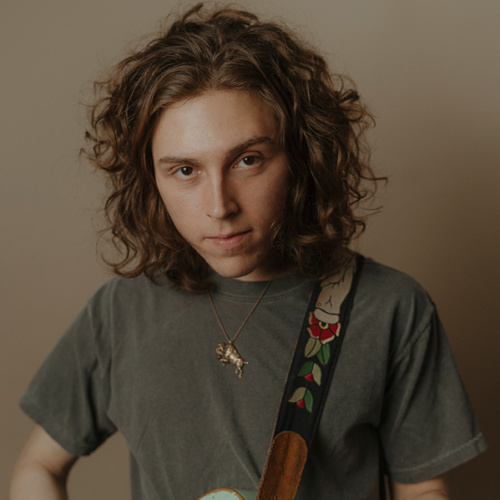
Daniel Donato
When people first meet Daniel Donato, they’re not fully braced for this walking tornado of creative energy. “They think there’s something that tips the scale in ways they don’t understand,” says Donato about his over-the-top, slightly manic vibe. “But what actually tips the scale is the amount of thought and analysis I put into my work and art, all of which is taken from the lessons of my life.”
Donato, a 25-year-old Nashville native, has distilled those life lessons into his debut album, A Young Man’s Country, his proper introduction to the general musical audience. Recorded at Nashville’s Sound Emporium in a mere two days and produced by guitar-ace Robben Ford, the record weaves outlaw country, Grateful Dead-style Americana, and first-rate songwriting into a singular form Donato calls “21st-century cosmic country.”
It might surprise some that the Telecaster-wielding wunderkind, who at 16 became the youngest musician to regularly play the iconic honky-tonk Robert’s Western World while gigging with the Don Kelley Band, began his musical journey in a purely millennial fashion. Before he ever picked up a guitar, he discovered he had an aptitude for music via the video game Guitar Hero. At the time, he didn’t feel compelled to try his hand at the real thing until one day, about the age of 12, he heard the electric perfection of Guns ‘N’ Roses’ “Paradise City” blast from a set of speakers and his world was changed forever.
“It was the first time I ever had a vision for my life,” says Donato, who was partly drawn to music because he sucked royally at skateboarding. “I then took one of my dad’s old guitars . . . and I literally fell in love with it.” From then on, Donato lived and breathed music, practicing his chops around the clock. He’d play before school, during his lunch break, and in the evenings at home, sometimes falling asleep with the six-string in his hands.
It wasn’t long before he was busking on lower Broadway in Nashville, playing eight hours a day on weekends for tips. It was after one of those day’s sessions that he got a wild hair and snuck into Robert’s on a night when house act the Don Kelley Band was playing and his wig-dome was blown. “It was the first time I ever saw a band that was that good up close,” Donato said. “So I’m literally watching them play and I’m crying. I decided right then that I wanted to be the best Guitar Player in the world.”
Donato continued busking outside arenas before John Mayer and Phish concerts and on the streets of Nashville and it was then, while playing on Broadway, that he’d give Don Kelley his business card every Saturday night, hoping for a chance to audition. One day, while still a junior in high school, he got the call to come play. Donato was more than ready, and he delivered the goods in spades. He was so good, in fact, that he became a regular member of the band, performing four nights a week for more than 450 shows with the group.
Playing nightly with the Don Kelley Band was a formidable education for the young musician. Jamming regularly with Nashville’s most seasoned players, stalwart pickers who may have played in Buck Owens’ band, or Dolly Parton’s, or Alan Jackson’s, expanded his musical vocabulary while honing his stage presence. Along the way, he was soaking up stories of adventures on the road and learning about the ups and downs of the music business. In short, he was gaining priceless life lessons and a musical education from wells that run deep into the musical history of Nashville.
Around the time he turned 18, one of Donato’s high-school Teachers, a serious music lover who had seen his student play at Robert’s, gave him a Grateful Dead box set. It was another eureka moment for the Guitarist. His love for the Dead may have been ignited much earlier by virtue of the fact that his mother was a bona fide Deadhead who followed the group on tour when she was pregnant with the future Guitarist, but it was that collection that changed the way he looked at music. “It gave me a tie to all of the classic country gold I’d been working down at the honky-tonks each weekend,” he said. “Grateful Dead and Merle Haggard had always lived in my heart, but now, the link was made, and I had a vision on how to keep it alive for this generation that I am coming from.”
During the days of his Robert’s residency, Donato continued to busk at various locales, even playing the Grand Ole Opry, and it is the sum of all these gigs, experiences any teenage musician would kill for, that inform the sounds on A Young Man’s Country.
“Ain’t Living Long Like This,” one of three covers on the album, is a song by Waylon Jennings, who was recording at the Sound Emporium the day Donato was born. “Angel From Montgomery,” a song Donato learned on the fly while busking for tourists, pays tribute to the late John Prine. Donato recorded his unique take on the tune before Prine’s death. The Grateful Dead’s “Fire On The Mountain” is tacked on to “Meet Me In Dallas,” a tune Donato wrote while on the road with Paul Cauthen. The other seven songs, all originals, showcase the promise of a young Songwriter coming into his own, one of the highlights being “Luck of the Draw.”
The message of these songs contains the central tenet of Donato’s “Cosmic Country” ethos, which is about finding the courage to blaze your own path. As such, it is an ethos the artist extends beyond music into the channels of social media, where he’s built up a huge following of devoted “DD Heads,” as his fans call themselves. His podcast, Daniel Donato’s Lost Highway, brings together like-minded creatives to get at the heart of what makes artists tick, for which he’s interviewed Brothers Osborne, Brent Cobb, Orville Peck, and Garry Talent of Bruce Springsteen’s E Street Band.
Incubated to the sounds of the Dead, educated by some of Nashville’s finest players, and having more than 2,000 shows under his belt and a social media presence, Daniel Donato is indeed a millennial whirligig of creative fire. He’s been dabbling in professional music since the age of 14 and yet he’s just getting started. A Young Man’s Country is the portrait of a restless artist as a young man, one whose story is singular and is still in its exciting, early chapters–and as this effort shows, the future is indeed cosmic.
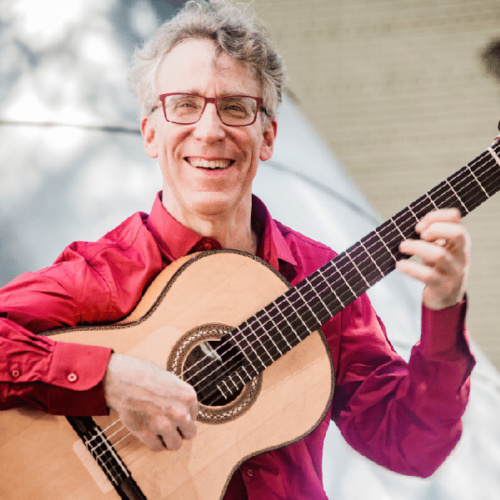
Eliot Fisk
Eliot Fisk began to study the guitar motivated by his brother Matthew, born with Down’s Syndrome. While the imagined family singing sessions to a guitar accompaniment never turned into anything, the instrument slowly became the focus of his life.
Ten months spent in Sweden attending elementary school in 1965-6 produced the necessary catalyst to learn Swedish fluently and to begin to practice the guitar seriously. This passion burst into full flame when on his return to his native Philadelphia Eliot began to study with the remarkable (and mostly self-taught) William Viola, whose love of the guitar was lifelong although his musical activities were mostly limited to teaching on Saturdays in a guitar store in Philadelphia.
In 1974 Eliot met and began to study with his idol Segovia and at Yale University (1972-77) supplemented those encounters with guidance from the great harpsichordist and scholar Ralph Kirkpatrick. Following his graduation from Yale summa cum laude and a successful debut at Alice Tully Hall in New York in 1976, Eliot Fisk began a professional career that has taken him around the world as a soloist and chamber musician performing in leading concert halls on 5 continents.
Eliot has created an enormous amount of new music for the guitar through innumerable transcriptions and many new works in all genres by eminent composers, written for and dedicated to him. His numerous recordings have achieved critical and public acclaim.
He has enjoyed a long career as an educator particularly at the Universitaet “Mozarteum” in Salzburg, where he teaches in 5 languages, and at the New England Conservatory in Boston, where in 2006 he founded the highly successful Boston Guitar Fest. Many of his students have become great leaders in the musical world and continue his efforts to combine the great romantic tradition with the best of modernity.
Together with his wife, virtuoso guitarist Zaira Meneses, he recently founded the Eliot Fisk Guitar Academy (EFGA) which aims to project his legacy of interdisciplinary musicianship and humanitarian aspiration around the world.
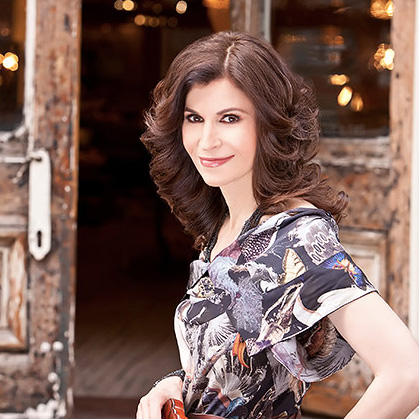
Sharon Isbin
Acclaimed for her extraordinary lyricism, technique and versatility, multiple GRAMMY Award winner Sharon Isbin was named the 2020 Musical America Worldwide Instrumentalist of the Year, the first guitarist ever to receive the coveted honor in its 59 year award history. Hailed as “the pre-eminent guitarist of our time,” she is the winner of Guitar Player magazine’s Best Classical Guitarist award, Germany’s Echo Klassik, Concert Artists Guild’s Virtuoso Award, and the Toronto and Madrid Queen Sofia competitions, and was the first guitarist ever to win the Munich ARD Competition. Isbin has appeared as soloist with over 200 orchestras and has given sold-out performances in many of the world’s finest halls, including New York’s Carnegie and Geffen Halls, Boston’s Symphony Hall, Washington D.C.’s Kennedy Center, Philadelphia’s Kimmel Center, London’s Barbican and Wigmore Halls, Amsterdam’s Concertgebouw, Paris’ Châtelet, Vienna’s Musikverein, Munich’s Herkulessaal, and Madrid’s Teatro Real. She has served as Artistic Director and soloist of festivals she created for Carnegie Hall and the Ordway Music Theatre (St. Paul), New York’s 92Y, and the national radio series Guitarjam.
American Public Television’s presentation of the acclaimed one-hour documentary Sharon Isbin: Troubadour has been seen by millions on over 200 PBS stations across the U.S., and abroad including Europe, Japan and Mexico. Winner of the ASCAP Television Broadcast Award, the film is available with bonus performances on DVD and Blu-ray. Watch the trailer at: www.sharonisbintroubadour.com Other recent national television performances on PBS include the Billy Joel Gershwin Prize with Josh Groban, and Tavis Smiley. A frequent guest on NPR’s All Things Considered and A Prairie Home Companion, Isbin has been featured on television throughout the world, including CBS Sunday Morning, Showtime’s The L Word, and as soloist on the GRAMMY nominated soundtrack of Scorsese’s Oscar-winning The Departed. She performed at Ground Zero for the first internationally televised 9/11 memorial, in concert at the White House by invitation of President Obama, and as the only classical artist to perform in the 2010 GRAMMY Awards. She has been profiled in periodicals from People to Elle, The Wall Street Journal, and The New York Times, as well as appearing on the covers of 50 magazines.
Isbin’s catalogue of over 30 albums from Baroque, Spanish/Latin and 20th Century to crossover and jazz-fusion, has sold nearly a million copies and reflects her remarkable versatility. Her two latest releases in May 2020 of world premiere recordings of music composed for her are Affinity featuring Chris Brubeck’s acclaimed concerto for guitar and orchestra, and Strings for Peace, with India’s legendary Amjad Ali Khan in a program of ragas for guitar, sarod and tabla. Her 2019 Souvenirs of Spain & Italy with the Pacifica Quartet showcases beautiful and rarely heard guitar quintets from the Baroque to mid-20th century, including works by Vivaldi, Boccherini and Castelnuovo-Tedesco, and debuted at #1 on Amazon and #2 on Billboard. Her Alma Española with Argentinian-American opera star Isabel Leonard has also been a #1 bestseller, and is the first Spanish art song album with guitar of its kind in 40 years. It includes twelve world premiere arrangements by Isbin, and was honored with a 2018 GRAMMY Award for Producer of the Year, Classical in recordings by David Frost. Other recent #1 bestselling titles include Sharon Isbin: 5 Classic Albums and Sharon Isbin & Friends: Guitar Passions with rock and jazz guests Steve Vai, Steve Morse, Heart’s Nancy Wilson, Stanley Jordan and Romero Lubambo. Her 2010 GRAMMY-winning Journey to the New World with guests Joan Baez and Mark O’Connor spent 63 consecutive weeks on top Billboard charts. Her Dreams of a World soared onto top classical Billboard charts, edging out The Three Tenors, and earned her a GRAMMY for Best Instrumental Soloist, making her the first classical guitarist to receive a GRAMMY in 28 years. Her world premiere recording of concerti written for her by Christopher Rouse and Tan Dun received a GRAMMY and Germany’s prestigious Echo Klassik Award. She received a Latin GRAMMY nomination and GLAAD Media Award nomination for Outstanding Music Artist (alongside Melissa Etheridge) for her Billboard Top 10 Classical disc with the New York Philharmonic of Rodrigo Concierto de Aranjuez/Ponce/Villa-Lobos concertos, the Philharmonic’s only recording with guitar, which followed their Lincoln Center performances with Ms. Isbin as their first guitar soloist in 26 years. Other bestselling titles include Baroque Favorites for Guitar with the Zurich Chamber Orchestra, and her GRAMMY nominated Journey to the Amazon with Brazilian percussionist Thiago de Mello and saxophonist Paul Winter. Her recordings have received many other honors, including Recording of the Year in Gramophone and CD Review, Recording of the Month in Stereo Review, and Album of the Year in Guitar Player.
Other CDs include J.S.Bach Complete Lute Suites, Aaron Jay Kernis’ Double Concerto with violinist Cho-Liang Lin and the Saint Paul Chamber Orchestra, Wayfaring Stranger with mezzo-soprano Susanne Mentzer, and concerti by Joaquin Rodrigo which the composer praised as “magnificent.” She is also featured on the GRAMMY Foundation’s Smart Symphonies CD distributed to over five million families.
Sharon Isbin has been acclaimed for expanding the guitar repertoire with some of the finest new works of our time and has commissioned and premiered over 80 works by world-renowned composers, including more concerti than any other guitarist, as well as numerous solo and chamber works. Works written for her by John Corigliano, Joseph Schwantner and Lukas Foss are featured on her American Landscapes, the first-ever recording of American guitar concerti. (In November 1995, it was launched in the space shuttle Atlantis and presented to Russian cosmonauts during a rendezvous with Mir.) She premiered Concert de Gaudí by Christopher Rouse with Christoph Eschenbach and the NDR Symphony, followed by the U.S. premiere with the Dallas Symphony. Among many other composers who have written for her are Joan Tower, David Diamond, Aaron Jay Kernis, Leo Brouwer, Howard Shore, Ned Rorem and Ami Maayani, with highlights including John Duarte’s Joan Baez Suite, and a duo by rock guitarist Steve Vai which they performed in Paris’ Théâtre du Châtelet. Recent premieres of compositions written for her include a work by Richard Danielpour co-commissioned by Carnegie Hall for its 125th anniversary and by Chicago’s Harris Theater, and the dazzling Affinity: Concerto for Guitar & Orchestra by Chris Brubeck which honors his father Dave Brubeck in his 2020-21 centennial.
Highlights include tours with the Zurich Chamber Orchestra, Austria’s Tonkünstler Orchestra and Belgium’s Philharmonique de Liege, a week of performances at the Théâtre du Châtelet in Paris, Filarmonica Toscanini in Milan, MIDEM Classical Awards in Cannes, and most recently, a 21-city Guitar Passions tour with jazz greats Stanley Jordan and Romero Lubambo, as well as collaborations with Sting, tours with the Pacifica Quartet, performances with the Detroit, National and Montreal Symphonies, and sold-out recitals in Carnegie Hall, Philadelphia’s Kimmel Center and the Kennedy Center. Her latest partnership, Strings for Peace, with sarod master Amjad Ali Khan in an extraordinary program of ragas for guitar and sarod, is an eloquent and impassioned call for harmony—in music, religion, and culture throughout the world. Strings for Peace debuted on a multi-city tour of India and will appear throughout North America in 2020 along with an album release.
Isbin has toured Europe annually since she was seventeen, and appears as soloist with orchestras throughout the world, including the New York Philharmonic, National Symphony, Baltimore, Detroit, Houston, Dallas, Pittsburgh, Minnesota, Montreal, St. Louis, Nashville, New Jersey, Louisville, Indianapolis, Milwaukee, Phoenix, Buffalo and Utah Symphonies; the London Symphony, Orchestre National de France; and BBC Scottish, Lisbon Gulbenkian, Prague, Milan Verdi, Belgrade, Mexico City, Jerusalem and Tokyo Symphonies; and chamber orchestras including Saint Paul, Los Angeles, Zurich, Scottish and Lausanne. Her festival appearances include Mostly Mozart, Aspen, Ravinia, Grant Park, Interlochen, Santa Fe, Mexico City, Bermuda, Hong Kong, Montreux, Strasbourg, Paris, Athens, Istanbul, Ravenna, Prague and Budapest International Festivals.
As a chamber musician, Ms. Isbin has also performed with the Emerson String Quartet and the Chamber Music Society of Lincoln Center, a Guitar Summit tour with jazz greats Herb Ellis, Stanley Jordan and Michael Hedges, trio recordings with Larry Coryell and Laurindo Almeida, and duo recordings with Carlos Barbosa-Lima. She collaborated with Antonio Carlos Jobim, and has shared the stage with luminaries from Aretha Franklin to Muhammad Ali.
Born in Minneapolis, Sharon Isbin began her guitar studies at age nine in Italy, and later studied with Andrès Segovia, Oscar Ghiglia, and for ten years with noted Bach scholar and keyboardist Rosalyn Tureck with whom she collaborated on landmark editions/recordings of the Bach lute suites for guitar (Warner Classics/G. Schirmer). She received a B.A. cum laude from Yale University and a Master of Music from the Yale School of Music. She authored the Classical Guitar Answer Book, and is Director of guitar departments at the Aspen Music Festival and The Juilliard School (which she created in l989 becoming the first and only guitar instructor in the institution’s 100-year history).
Sharon Isbin has been practicing Transcendental Meditation since age 17 and donates her time to perform benefits for the David Lynch Foundation, along with Katy Perry, Sting, Hugh Jackman, Jerry Seinfeld and Jay Leno, to bring TM to at-risk communities. In her spare time, she enjoys trekking in the jungles of Latin America, cross-country skiing, snorkeling and mountain hiking.
References
- 1. "Guitarist Salary". ZipRecruiter. published: Oct 18, 2024. retrieved on: Oct 25, 2024
- 2. " Best way to get paid as a guitarist in 2024 ". Reddit. published: Sept 2024. retrieved on: Oct 25, 2024

